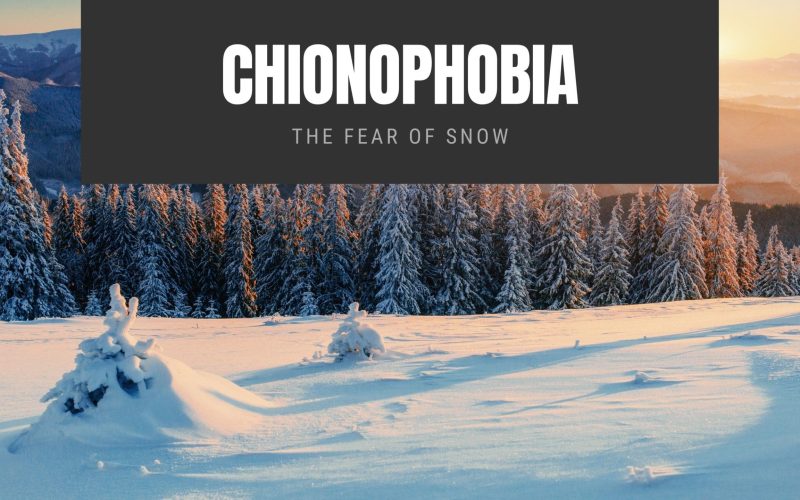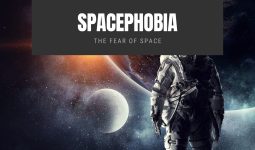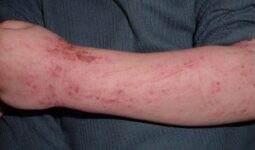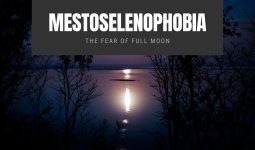Chionophobia is the irrational dislike or fear of snow. Individuals suffering from this condition find it difficult to be around snow.
People with chionophobia may display extreme signs of anxiety when exposed to snow.
While snowstorms can cause concerns, people with chionophobia would still experience uncontrollable fear that may seem exaggerated, even in cases where snowfalls aren’t severe.
Due to this condition, major life decisions may be made, including moving to areas with little snowfall.
Sufferers often know their fear of snow is unusual and weird, but they can’t control their feelings.
Living with the phobia can be challenging, especially for those who live in areas with frequent snowfall.
Depending on the location, the disorder may affect the quality of life and negatively impact their relationships with family and those close to them.
It’s not uncommon for a person with the condition to suffer from OCD (obsessive-compulsive disorder) or GAD (generalized anxiety disorder), among other complications.
Causes
While the leading causes of chionophobia are still unknown, others believe it can be triggered by a traumatic childhood event linked with snow.
A person may develop the condition after a terrible experience, such as being trapped, experiencing an avalanche, or being in a car accident involving snow.
The phobia could also be manifest when someone very close is greatly affected by a snow-related incident or death.
Hospitals have seen children rushed in from complications caused by diseases or injuries inspired by snow.
Accumulated snow could contain salts, sharp objects, bodily fluids, chemicals, and other dangerous substances.
People with chionophobia may have had their share of hospital experiences from ingesting contaminated snow.
Individuals with an irrational fear of water can also develop a fear of snow. Other factors could also include front bite, hypothermia, near-death experiences, and health complications caused by snow.
Furthermore, a person’s genetics or environment may play a significant role in the development of chionophobia.
Also, people with a family history of mental health issues have a higher chance of developing an uncontrolled snow fear.
Symptoms
Symptoms of chionophobia can trigger severe symptoms that can affect a person’s quality of life. Individuals with extreme fear of snow may experience heightened vulnerability, anxiety, and fear, among other complications.
Sufferers may find it difficult to express themselves or detach from society during the winter when snowfall is most prevalent.
Some individuals with chionophobia may experience symptoms more intense than others, and vice versa. Some common symptoms experienced may include:
- Difficulty controlling emotions
- Anxiety when surrounded by snow
- Depression
- Panic attacks
- Crying
- Stomach disorder
- Nausea
- Vomiting
- Muscle tension
- Sweating
Treatment
There are no known methods of treating chionophobia, but effective ways of managing the condition exist. These methods may include the following:
Exposure therapy
This is one of the most common methods of treating anxiety disorders triggered by the fear of snow. Exposure therapy can be an effective way of desensitizing patients to what scares them.
Nevertheless, people who have chionophobia must consult with a credible therapist to help them better deal with the phobia.
A therapist may expose patients with chionophobia to their object of fear, “snow.” Depending on how a patient reacts, the level of exposure may be measured from minimal to extreme.
This can help the therapist understand the severity of the condition and how much the patient can withstand.
Sudden excessive exposure can be counterproductive, as patients may manifest all symptoms simultaneously.
This extreme method can also worsen the condition in people with chionophobia. It helps a therapist be aware of how intense the condition is in their patient.
So, a therapist needs to get all the information they can about their patient before anything. This includes knowing how severe the patient’s symptoms are before exposing them to their object of fear.
Exercise
Working out has proven to be very helpful for individuals with anxiety disorder caused by chionophobia. Experts advised that cardiovascular exercises can be utilized to help with relieving stress in people with chionophobia.
Daily exercises can condition a person’s mind to cope better in stressful situations. Engaging in aerobics can minimize symptoms caused by the fear of snow by making it easier to manage complications such as stress and anxiety.
Patients can engage in exercises that include bike riding, swimming, walking, skiing, and jogging. Sports like basketball, football, tennis, and racquetball can also be included to manage the condition better and strengthen the mind and body.
Yoga
The benefits of including yoga in your daily routine are numerous, and the practice can significantly help people dealing with chionophobia.
Experts claim that the meditative stance that people who engage in yoga maintain can help to calm the mind easily.
This practice can be implemented to relieve stress and anxiety that is linked to chionophobia. Sufferers who engage in yoga can quickly calm their minds whenever they are about to have an episode inspired by the condition.
Patients can consult their yoga instructors for effective yoga poses to help with the fear of snow.
The more energy you put into the practice, the better it is to manage the condition’s symptoms.
Yoga practice can also help to maximize flexibility and strength in people with chionophobia.
Meditation Practice
Several forms of meditation can be beneficial for people who have chionophobia. Mindfulness meditation has proven helpful in managing and controlling complications associated with the fear of snow.
Experts believe that this practice can significantly help people with chionophobia by improving how they distract themselves from what scares them.
Meditation helps patients learn to focus on things that can calm them when faced with stressors.
Patients can engage in breathing exercises to help them relax and incorporate this practice when they feel stressed or anxious.
People with chionophobia can also focus on the sounds around them by filtering through them till they find one that soothes them.
Others use smell and taste, among other things, to control symptoms of chionophobia. The idea is to tap into all senses till you find any that best suits you.
There is a popular saying, “Practice perfect,” so patients are advised to continue practicing until they can naturally beat their fears.
Mindfulness-Based Stress Reduction (MBSR)
This program runs for eight weeks, and it offers extensive mindfulness exercise that helps a person with stress, anxiety, depression, and more. MBSR can be used to help individuals with chionophobia.
This structured program teaches patients with chionophobia an extensive set of skills that can be used in relieving severe cases of anxiety that are triggered by snow-related phobia.
Discuss with your medical doctor or therapist how to incorporate MBSR into your treatment.
Psychiatric Medications
- Antidepressants: These forms of medications are not only developed for people who suffer from depression. People with anxiety disorder caused by the fear of snow can also take advantage of the medicine. Common antidepressants that can be used include Zoloft, Paxil, Lexapro, and many more. Patients can use these drugs to control and reduce some symptoms they might be experiencing. Antidepressants can be taken to prevent panic attacks, anxiety, depression, and stress caused by chionophobia. Patients can discuss with their doctor the best medications to use.
- Anti-anxiety medications: Anti-anxiety medications can be taken to help manage anxiety and panic attacks. This is exceptionally useful for people dealing with extreme panic attacks caused by chionophobia. Some well-known anti-anxiety drugs include Valium, Xanax, Klonopin, and more.
Prospective medication users are advised to first consult with their doctors before anything. This is to ensure that it is safe to use some anti-anxiety medications.
Cognitive Behavioral Therapy (CBT)
CBT is incorporated to help improve a person’s mental health. This form of therapy can be used to treat people with anxiety disorder and OCD.
It also provides an avenue for people with chionophobia to see how CBT can help them understand why they behave and think the way they do regarding their irrational fear of snow.
CBT can help a person with the phobia by helping them take total control of how they function, particularly when the symptoms begin to manifest.
For instance, when a person with chionophobia is exposed to the source of their fear, they can instantaneously react to that fear positively.
Lacking that level of introspecting is believed to explain why people with the condition suffer the way they do. The therapy allows you to analyze your fears from a different perspective that you’d usually ignore.
Dialectical Behavior Therapy (DBT)
Experts believe that DBT is an efficient form of therapy developed for individuals struggling with emotion control or regulation.
This form of treatment is used to treat patients suffering from BPD (borderline personality disorder.
Notwithstanding, this therapy is also beneficial for people suffering from stress and anxiety disorder linked with chionophobia.
DBT groups help provide people with the fear of snow with extensive coping skills that can’t help them through any episodes.
Patients can be taught to incorporate smiling to rewire their brains to react differently when faced with stressors.
Control Caffeine Consumption
It is no news that the consumption of caffeine in large quantities daily can worsen anxiety. The heart beats faster when too much caffeine is in the body, which can end badly.
Ultimately, our body will go into a “fight or flight” mode, and this state of mind is often a trigger for people with chionophobia to manifest underlying symptoms.
So, taking a small amount of caffeine may be able to reduce your day-to-day anxiety. Nevertheless, reducing your caffeine intake doesn’t guarantee that all of your anxiety will disappear.
It reduces the unnecessary suffering that would have been experienced if you were to take large amounts of caffeinated substances.
Beverages like tea and coffee, including most energy drinks, are often high in caffeine. People with chionophobia should also confirm that some foods on their menu are caffeine-free.
Being conscious of your daily caffeine intake can help to minimize some of the symptoms linked with chionophobia.








